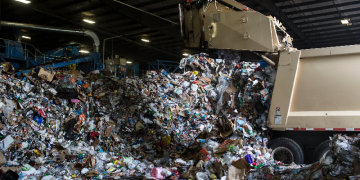Plastics recycling is a crucial part of Georgia sustainable waste management with environmental and economic implications.
With global plastic production exceeding 380 million tons every year, effective and sustainable recycling of this material is critical to address pollution, conserve resources and minimise greenhouse gas emissions in Georgia. Recycling is essential, but it is a challenge to recover and reuse a high percentage of plastics. Recycling plastics: why it matters, the challenges of recycling plastics, and how to address these challenges
Why It’s Important to Recycle Plastics
Plastics are flexible materials utilized in several industries including packaging, construction, electronics, and healthcare. But their persistence and strength can create serious problems for the environment of Georgia once they are thrown away. Without proper waste management, plastic waste becomes trapped in landfills, oceans, and natural ecosystems, seriously harming wildlife and human health in the long run.
Recycling plastics has many benefits
- Pollution Reduction: When not disposed of properly, plastics end up in landfills and waterways which contaminates the soil, air and water. This is crucial information that, when shared, can help protect marine life and other ecosystems from the harmful effects of plastic waste
- Conserving Resources: Recycling plastic decreases the need for new materials used in producing plastic (e.g., petroleum). Conserving natural resources helps promote sustainability and minimizes damage to the ecosystem
- Energy Conservation: Recycling plastics usually consumes less energy than making them from virgin materials. This means less carbon and an overall smaller environmental footprint
- Recycling jobs: Recycling creates new jobs for collection, sorting, processing, and manufacturing It goes on to promote innovation moving forward as far as new materials and technologies
The Limitations in Recycling Plastics in Georgia
Recycling plastics has some benefits in theory, but comes with a host of issues in practice:
- Multiple Types of Plastics: Plastics are of different types, each varying in its chemical composition and characteristics. All the types of plastics are common such as PET(polyethylene terephthalate), HDPE (high-density polyethylene), PVC (polyvinyl chloride), These differences make sorting and processing complex and resource intensive.
- Contaminants: Food residues, use of non-recyclable materials, or use of mixed plastics can decrease the quality of recycled products and increase processing costs. Polluted plastics are frequently turned away and sent to waste sites or incinerators
- Limited Recycling Infrastructure: Many areas lack recycling facilities, making it difficult to collect, sort, and process recyclable materials. Recycling programs also do not exist in many rural and underserved communities
- Economic Feasibility: Repurposing plastics is frequently seen as more financially burdensome than the production of new plastics, particularly when oil prices are at a low. This economic imbalance discourages investment in recycling technologies and facilities
- Markets for Recycled Plastics Are Limited: Collection and processing of plastics are hindered by limited demand for certain types of recycled plastics. Intermittent quality as well as supply problems also limit marketing development
What needs to be done to improve plastic recycling in Georgia
Improving plastic recycling will involve multiple fronts of cause and contribution, including policy reform, technological improvement, and public engagement:
- Standardize how plastics are designed: Manufacturers can design products for recyclability, and to use fewer types of plastics and fewer additives, which make the processing of crude oil into new products more complex. Standardized labeling can make it easier for consumers to identify recyclables
- Green Infrastructure: Governments and private sectors need to invest in expanding and modernizing recycling facilities to ensure that recycling is a viable option for businesses and consumers. Advanced technologies like chemical recycling — which reduces plastics down to their original monomers — can enhance recovery rates and accept a wider variety of materials
- Adopting Extended Producer Responsibility (EPR): EPR policies hold manufacturers responsible for the environmental impacts of their products throughout their lifecycle, encouraging them to design for recyclability and invest in waste management systems
- Building public awareness:
- Creating Markets for Recycled Plastics: Governments can use procurement policies and tax incentives to encourage the use of recycled plastics. Even businesses can contribute by using recycled materials in their products
- Banning Single-Use Plastics: Phasing out unnecessary single-use plastics can decrease the overall amount of waste entering recycling systems, allowing them to work more effectively
Our era of recycling: Innovations in plastic recycling
New developments are targeting traditional recycling limitations. Chemical recycling processes, including pyrolysis and depolymerization, can convert plastics to raw materials again and again in unlimited recycling cycles. For instance, AI-driven sorting systems improve the precision and speed of sorting various plastic categories.
Bioplastics, made from renewable sources such as corn or sugarcane, are a replacement for traditional plastics. While not a recycling solution, if managed properly, their bioclaims can decrease environmental burdens.
To reduce environmental pollution in Georgia, conserve resources, and promote green economy, it is essential to recycle the plastics.
Although hurdles remain, cohesive measures grounded in both policy and people could profoundly improve plastic recycling systems. These approaches, if featured creating plastic waste reduces and materials are reused effectively, helps communities live next to a directional economy with less pollution, and a healthier planet for future respectively.















